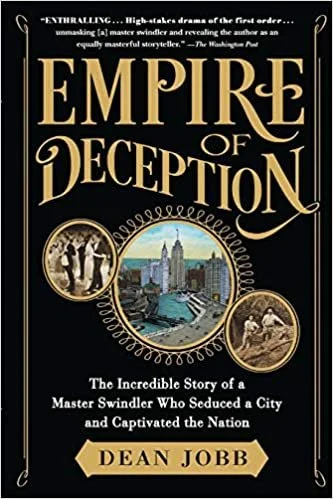Book Review: Empire of Deception
Empire of Deception. Dean Jobb. Algonquin Books, January 5, 2016, Hardcover, Trade Paperback, and Kindle, 336 pages.
Reviewed by Dennis Hetzel.
After reading Empire of Deception, you’ll wonder why we don’t say “Koretz scams” instead of “Ponzi schemes.”
Both terms denote frauds perpetrated by sophisticated hucksters of the 1920s. Ponzi and Koretz lured people who should have known better into giving them money, primarily because their understanding of human nature would put your average psychologist to shame.
In Empire of Deception, Leo Koretz gets some overdue recognition, and Dean Jobb’s biography makes for an entertaining story filled with foes, felons, fair-weather friends, family forgiveness, and fresh insight into the human condition.
Koretz was a smooth, charismatic Chicago lawyer who defrauded even friends and family into investing in non-existent Arkansas timber and Panamanian oil wells that never pumped black gold. The total proceeds of his maneuvers would tally $400 million or more in today’s dollars.
These are pyramid schemes. You think you’re investing in something tangible, but there’s no “there” there. You’re investing in the man. Ponzi and Koretz built pyramids in which the proceeds of an ever-growing number of investors at the bottom paid dividends to the ones above. Inevitably, the pyramid must collapse, swallowing the swindlers as well. In the modern era, Wall Street huckster Bernie Madoff was the natural successor; another self-justified con man whose embarrassed victims failed to learn the time-tested motto: Trust but verify.
Every good crime story needs a hunter as well as a hunted. The rivalry between Koretz and Robert Crowe, the flawed, ambitious state’s attorney of Cook County fighting for his political life, provides the conflict that both frames and energizes the story.
There’s also a richer story underneath. Leo’s life really is a study of the power of confidence and charisma; a primer on how to exploit the need we all feel to belong to a winning team. Jobb shows us how Koretz mastered the soft sell. By saying “no” to potential investors, they only wanted him more. The same could be said of women from Chicago to Canada who were strangely attracted to a short, bespectacled man who struggled with diabetes; a man who, once again, turned out to be much more than he appeared to be on the surface.
As a real bonus for any Chicago audience, the book captures the essence of the Windy City during the 1920s, which was as ripe for get-rich-quick schemes as it was for flagrant political corruption, double-dealing, and mob violence. Here’s an excerpt that describes the Chicago of the era:
In one courtroom, it was claimed, a system had been worked out: if a bailiff stationed in a back room knocked on the wall when a defendant’s case was called, it was a signal to the prosecutor and judge that payment had been received . . . So many judges were turning up at the funerals of slain gang members that a senior jurist made a public plea for them to stop.
In later chapters, the tale moves to Nova Scotia, where Koretz changed his name to Lou Keyte to charm and delight the populace with his flashy Chicago lifestyle while he dodged prosecution. There, too, most of the residents—but not all—accepted Keyte’s explanations at face value. Jobb brings remote Nova Scotia and the close-knit city of Halifax in the 1920s to life, a role for which the author is well equipped as a journalism professor at University of King’s College in Halifax.
Koretz’s scams and the subsequent hunt for him became an international sensation. Jobb chronicles how the media and the public couldn’t get enough; supercharged by a journalistic frenzy that reminds us that over-the-top coverage of colorful newsmakers isn’t a recent trend. Still, such infamy can be fleeting. Today, Koretz is nearly forgotten.
Jobb’s book may change that. As he points out in Empire of Deception, the modern world’s amnesia about Leo Koretz could be the ultimate insult to Leo’s ego and flawed brilliance. It’s engaging material—well sourced, richly described, and authentic feeling. Jobb, the author of six previous books, is a worthy, astute historian who found a great story to tell.

